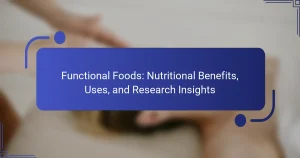Personalized nutrition leverages technology to enhance health outcomes by tailoring dietary recommendations to individual needs. This article explores data analytics, wearable devices, and AI’s role in creating customized nutrition plans. It also examines the impact of genetics and lifestyle on dietary strategies, highlights successful case studies, and addresses challenges in implementation. Emerging trends in technology-driven approaches will be discussed, showcasing their potential to improve health management.
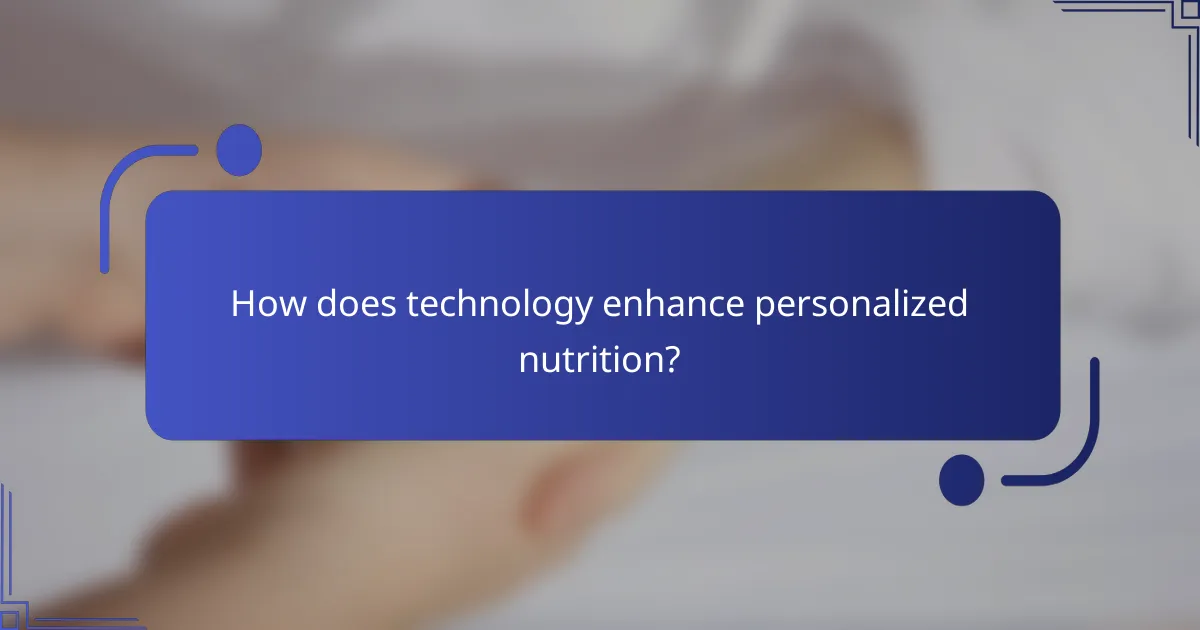
How does technology enhance personalized nutrition?
Technology enhances personalized nutrition by using data analytics, wearable devices, and AI to tailor dietary recommendations. These methods analyze individual health metrics, preferences, and genetic information. For example, apps can track nutrient intake and suggest adjustments based on real-time feedback. As a result, users achieve better health outcomes, such as improved metabolic rates and weight management. The integration of technology enables a unique approach to nutrition that adapts to personal needs and lifestyle changes.
Which technologies are most commonly used in personalized nutrition?
Personalized nutrition commonly utilizes technologies such as genetic testing, wearable devices, mobile apps, artificial intelligence, and microbiome analysis. These tools enhance dietary recommendations based on individual health data and preferences. Genetic testing identifies specific nutrient needs, while wearable devices track physical activity and biometrics. Mobile apps facilitate meal planning and nutritional tracking. Artificial intelligence analyzes vast datasets to provide personalized insights. Microbiome analysis assesses gut health, influencing dietary choices for optimal wellness.
How do wearable devices contribute to dietary customization?
Wearable devices enhance dietary customization by tracking individual health metrics and preferences. These devices collect data on activity levels, sleep patterns, and biometric indicators, allowing for tailored nutrition recommendations. For example, a wearable can suggest meal plans based on real-time calorie expenditure and nutrient needs, promoting better health outcomes. This technology-driven approach supports personalized nutrition by adapting to unique lifestyle factors and dietary goals.
What role do mobile applications play in tracking nutrition?
Mobile applications significantly enhance nutrition tracking by providing personalized insights and real-time data. They enable users to monitor their dietary intake, set goals, and receive tailored recommendations based on individual health metrics. These apps often incorporate features like barcode scanning, meal logging, and nutrient analysis, which facilitate informed food choices. As a result, users can achieve better health outcomes through improved dietary habits and accountability.
How is artificial intelligence applied in nutrition personalization?
Artificial intelligence enhances nutrition personalization by analyzing individual dietary needs and preferences. It utilizes data from various sources, including genetic information, lifestyle habits, and health metrics, to create tailored nutrition plans. AI algorithms can predict optimal food choices that align with personal health goals, leading to improved outcomes. For instance, machine learning models can identify food sensitivities and recommend alternatives, ensuring a more effective dietary approach. As a result, individuals receive customized guidance that adapts over time, reflecting changes in health status or lifestyle.

What are the health outcomes associated with personalized nutrition?
Personalized nutrition can lead to improved health outcomes by tailoring dietary recommendations to individual needs. This approach enhances metabolic health, supports weight management, and reduces the risk of chronic diseases. Research indicates that personalized nutrition can improve nutrient absorption and optimize dietary patterns based on genetic, microbiome, and lifestyle factors. For instance, individuals with specific genetic markers may benefit from higher omega-3 intake, while others may require different macronutrient ratios to achieve optimal health.
How does personalized nutrition impact weight management?
Personalized nutrition significantly enhances weight management by tailoring dietary plans to individual needs. This approach considers unique attributes such as genetics, lifestyle, and metabolic responses. Studies show that personalized diets can lead to more effective weight loss compared to standard diets, improving adherence and outcomes. As a result, individuals experience better health and sustainable weight management.
Which chronic diseases can be managed through personalized dietary plans?
Personalized dietary plans can effectively manage chronic diseases such as diabetes, hypertension, heart disease, and obesity. These plans are tailored to individual health needs, improving outcomes. For instance, diabetes management can involve specific carbohydrate intake guidelines, while heart disease may focus on reducing saturated fats. Personalized nutrition enhances adherence and promotes better health results.
What psychological benefits arise from tailored nutrition approaches?
Tailored nutrition approaches offer significant psychological benefits, including improved mood and reduced anxiety. Personalized diets can enhance self-efficacy, fostering a sense of control over health. This empowerment can lead to better adherence to dietary changes, promoting long-term health outcomes. Additionally, customized nutrition plans may improve cognitive function by ensuring optimal nutrient intake, which supports brain health. Overall, these approaches can positively influence mental well-being and life satisfaction.
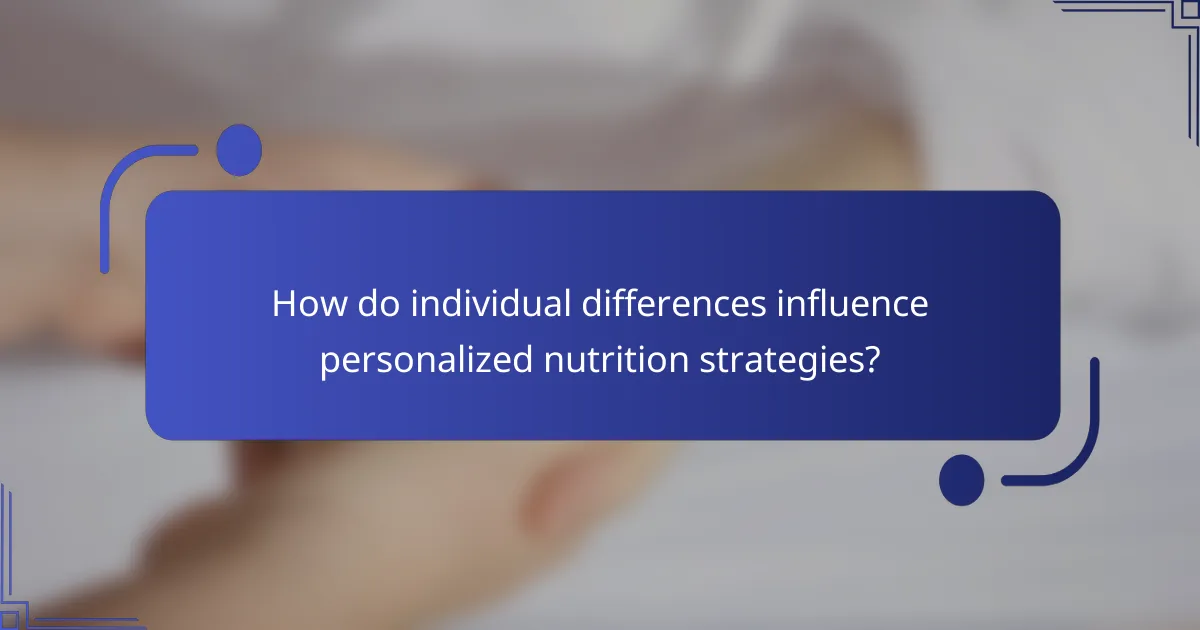
How do individual differences influence personalized nutrition strategies?
Individual differences significantly shape personalized nutrition strategies by tailoring dietary recommendations to individual needs. Factors such as genetics, metabolism, lifestyle, and health conditions influence how individuals respond to various foods. For example, genetic variations can affect nutrient absorption and metabolism rates, leading to unique dietary requirements. Personalized nutrition leverages technology, such as DNA analysis and metabolic profiling, to create customized plans that optimize health outcomes. These tailored strategies aim to enhance nutrient intake, improve metabolic efficiency, and support overall well-being.
What genetic factors affect dietary needs and responses?
Genetic factors significantly influence dietary needs and responses by affecting metabolism, nutrient absorption, and food preferences. Genetic variations can lead to different reactions to macronutrients and micronutrients, impacting overall health outcomes. For instance, individuals with specific gene variants may require higher levels of certain vitamins or exhibit sensitivities to particular foods. Personalized nutrition leverages these genetic insights to tailor dietary recommendations, enhancing health and wellness.
How do lifestyle choices shape personalized nutrition recommendations?
Lifestyle choices significantly influence personalized nutrition recommendations by tailoring dietary plans to individual needs. Factors like physical activity, stress levels, and sleep patterns affect metabolism and nutrient requirements. Technology analyzes these lifestyle elements, enabling precise adjustments in nutrition strategies. For example, a sedentary lifestyle may necessitate a higher protein intake for muscle maintenance, while an active individual might require more carbohydrates for energy. This customized approach enhances health outcomes, promoting better weight management and overall well-being.
Which demographic factors are critical in tailoring nutrition plans?
Demographic factors critical in tailoring nutrition plans include age, gender, ethnicity, socioeconomic status, and lifestyle. These factors influence dietary needs, preferences, and potential health risks. For example, older adults may require different nutrient levels compared to younger individuals. Additionally, cultural backgrounds can dictate food choices and dietary restrictions. Socioeconomic status impacts access to nutritious foods, while lifestyle factors such as physical activity levels also play a vital role in shaping effective nutrition plans. Understanding these attributes ensures personalized nutrition strategies align with individual health outcomes.
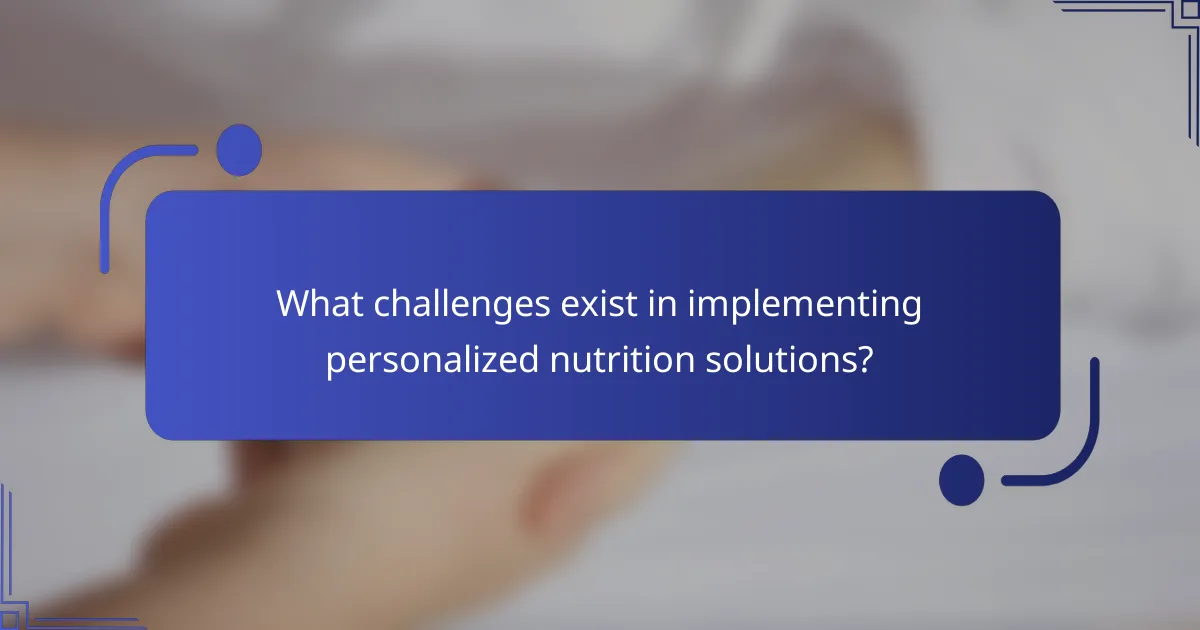
What challenges exist in implementing personalized nutrition solutions?
Implementing personalized nutrition solutions faces several challenges. Data privacy concerns hinder user trust and participation. Additionally, the complexity of individual dietary needs complicates effective personalization. Integration of diverse technologies can be resource-intensive, leading to higher costs. Furthermore, limited consumer awareness about personalized nutrition impacts adoption rates. Finally, regulatory hurdles can restrict innovation and scalability in this field.
How do data privacy concerns affect user adoption of personalized nutrition tools?
Data privacy concerns significantly hinder user adoption of personalized nutrition tools. Users often fear data misuse, leading to reluctance in sharing personal health information.
Privacy issues can deter engagement, as individuals prioritize security over personalized benefits. Studies show that 60% of potential users hesitate due to privacy worries.
Trust in technology is crucial; users seek assurance that their data will be protected. Companies must implement robust data protection measures to build confidence and enhance user adoption.
Transparent privacy policies and user control over data can mitigate concerns. By addressing these issues, personalized nutrition tools can become more widely accepted and utilized.
What are the limitations of current personalized nutrition technologies?
Current personalized nutrition technologies face several limitations. They often lack comprehensive data integration, which hinders accuracy in dietary recommendations. Additionally, many tools rely on self-reported information, leading to potential biases. User engagement can be inconsistent, affecting the effectiveness of personalized plans. Moreover, privacy concerns arise from data collection practices, limiting user trust. Finally, the scientific validation of many technologies is still insufficient, which can undermine their credibility and reliability.
How can misinformation about personalized nutrition be addressed?
Misinformation about personalized nutrition can be addressed through education, transparency, and evidence-based practices. Promoting accurate information helps individuals make informed choices regarding their health. Collaboration among experts, healthcare providers, and technology platforms can enhance credibility. Regular updates on research findings can counteract outdated or false claims. Engaging communities in discussions fosters a better understanding of personalized nutrition’s benefits and limitations.
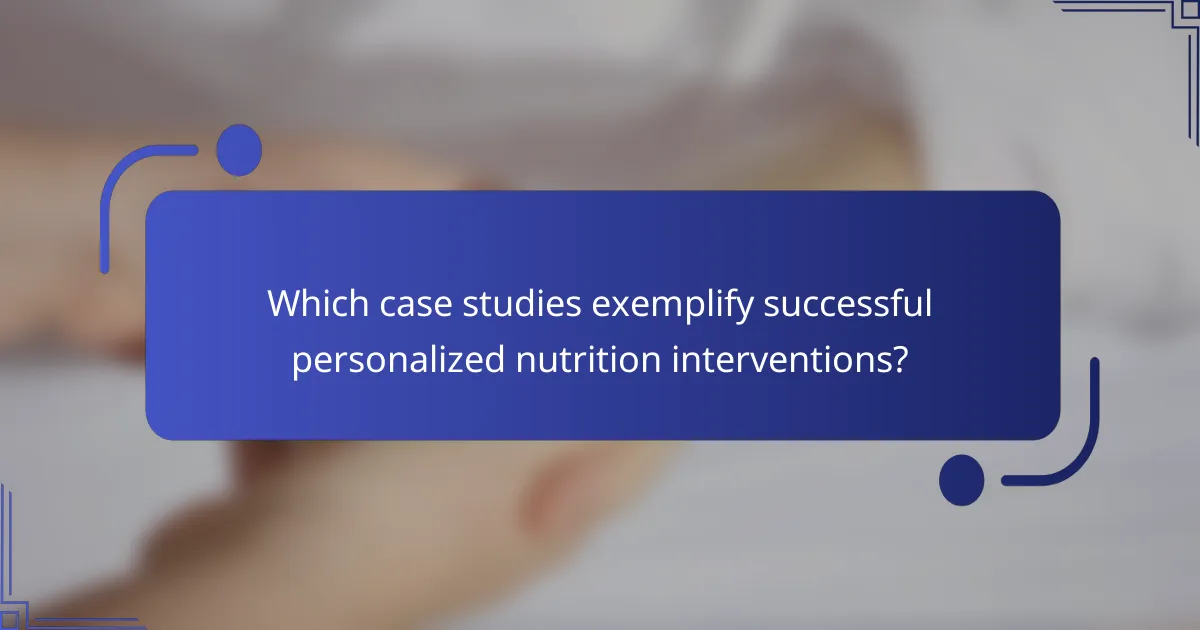
Which case studies exemplify successful personalized nutrition interventions?
Several case studies highlight successful personalized nutrition interventions. One notable example is the use of genomic data to tailor dietary recommendations for individuals with specific health conditions. A study involving patients with obesity demonstrated that personalized meal plans based on genetic profiles led to significant weight loss and improved metabolic markers.
Another case study focused on a mobile application that tracked users’ dietary habits and provided customized feedback. Participants reported increased adherence to healthy eating patterns and better overall health outcomes.
Additionally, a clinical trial examined the impact of personalized nutrition advice on patients with diabetes. Those receiving tailored dietary guidance showed better glycemic control compared to those following standard dietary recommendations.
These examples underscore the effectiveness of technology-driven personalized nutrition approaches in enhancing health outcomes.
What lessons can be learned from corporate wellness programs?
Corporate wellness programs offer valuable lessons in promoting personalized nutrition through technology. They enhance employee engagement and health outcomes by tailoring nutrition plans to individual needs.
Key insights include the importance of data-driven approaches, which utilize wearable technology and apps to track dietary habits. This personalization fosters accountability and encourages healthier choices. Additionally, integrating nutrition education into wellness initiatives can lead to significant improvements in overall well-being.
As a result, companies can expect reduced healthcare costs and increased productivity from healthier employees. These programs demonstrate that a customized approach to nutrition can effectively support individual health goals.
How have personalized nutrition strategies been implemented in clinical settings?
Personalized nutrition strategies have been effectively implemented in clinical settings through tailored dietary plans based on individual genetic, metabolic, and lifestyle factors. These strategies utilize technology such as genetic testing and digital health tools to optimize patient outcomes. For example, healthcare providers analyze patients’ genetic profiles to recommend specific nutrient intakes that align with their unique needs. As a result, personalized nutrition has shown improvements in managing chronic diseases, enhancing overall health, and promoting adherence to dietary recommendations. This approach emphasizes the importance of individualized care in achieving better health outcomes.
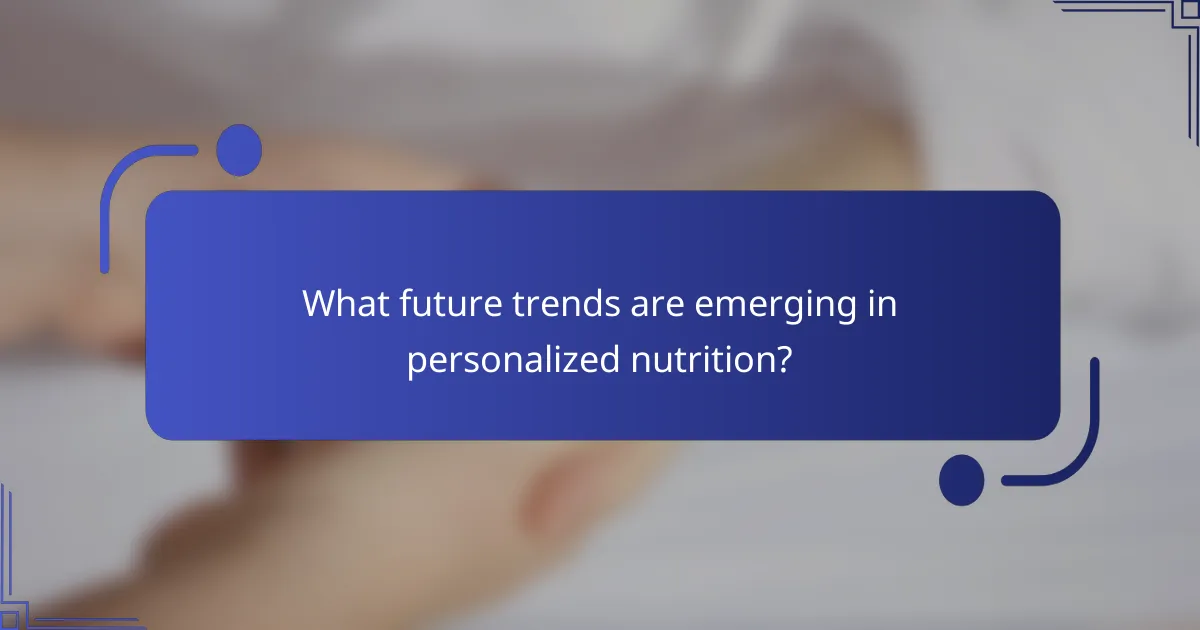
What future trends are emerging in personalized nutrition?
Emerging trends in personalized nutrition focus on technology-driven approaches that enhance health outcomes. Advances in artificial intelligence and machine learning enable tailored dietary recommendations based on individual genetics, lifestyle, and preferences. Wearable devices track real-time health metrics, providing data for personalized meal planning. Additionally, genetic testing offers insights into nutrient needs and potential food sensitivities. The integration of telehealth services allows for continuous support from nutrition experts, fostering adherence to personalized plans. As a result, these innovations lead to improved health management and enhanced well-being.
How might advancements in biotechnology shape nutrition personalization?
Advancements in biotechnology will significantly enhance nutrition personalization by enabling tailored dietary recommendations based on individual genetic and microbiome data. These innovations allow for precise identification of nutrient needs, optimizing health outcomes. For example, genetic testing can reveal specific dietary sensitivities, guiding personalized meal plans that improve metabolic health. As a result, individuals can achieve better weight management and overall wellness through customized nutrition strategies.
What role will machine learning play in the evolution of dietary recommendations?
Machine learning will significantly enhance dietary recommendations by enabling personalized nutrition. It analyzes individual health data, preferences, and genetic factors to tailor dietary advice. This technology-driven approach improves health outcomes by promoting adherence and optimizing nutrient intake. For example, algorithms can predict how specific foods impact a person’s metabolic response, leading to targeted recommendations. As a result, machine learning fosters a shift from generic guidelines to customized nutrition plans, aligning dietary choices with individual health goals.
Which societal shifts could influence the growth of personalized nutrition?
Societal shifts such as increased health awareness, advancements in technology, and personalized healthcare are driving the growth of personalized nutrition. Consumers are seeking tailored dietary solutions that align with their unique health profiles. As technology evolves, data-driven insights enable more precise dietary recommendations. This shift towards individualized health management reflects a broader trend of prioritizing wellness and preventive care.
What best practices should individuals consider when seeking personalized nutrition advice?
Individuals seeking personalized nutrition advice should prioritize evidence-based information and consult qualified professionals. Focus on understanding your unique health needs, dietary preferences, and lifestyle factors. Utilize technology, such as apps and wearable devices, to track progress and gather data. Engage in continuous learning about nutrition trends and research to make informed choices. Lastly, maintain open communication with healthcare providers to adjust personalized plans as needed.

